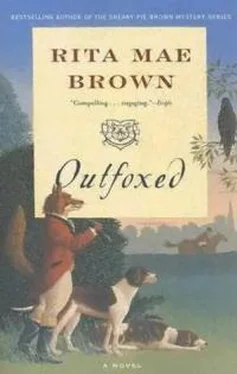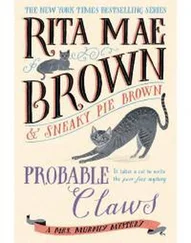The risk in killing a human being when near to a hundred mounted followers as well as foot followers bespoke either boldness or frenzy. Granted, the foot followers remained on Hangman’s Ridge with Peter Wheeler. Foot followers almost always camped out at the Hangman’s Ridge fixture because of the vistas and because they could eat their breakfasts, drink coffee or roped coffee, and catch up with old friends.
The killer knew all this, of course, but what puzzled her was why take such a chance? It was a hell of a chance. Wouldn’t it have been easier to lure Fontaine onto a back country road and shoot him? Or poison him?
On one level she was furious, white-hot with rage, that someone would commit a crime in her hunt field.
On another level, she was frightened. The swiftness of the murder, the cool appraisal of the situation, and then the lightning strike, pointed to an exceptionally courageous person.
She’d listened to the arguments and theories from friends. It had to be a foxhunter, one who really knew the sport. Well, that was obvious. Others said it was planned but impromptu, which is what she, Shaker, and Doug pieced together once down in the slippery ravine.
Still, there was an element of elegant revenge. The killer picked the hunt field for an emotional charge. The hunt field meant the world to Fontaine but it must also have meant something for the killer or for the killer and Fontaine together.
She also thought it would decimate her hunt field. What a pity, for the season had promised to be a great one, one of those magical seasons that rolls around every fifteen to twenty years.
She’d canceled Tuesday’s hunt since the funeral was Wednesday. Tomorrow the regulars would be out. Saturday would tell the tale because it was an especially good fixture, Beveridge Hundred.
She turned out the light but couldn’t sleep. Every time she’d turn Golly would grumble. Finally, she clicked on the light to read Anna Karenina . Tolstoy was a bit of a hunting man. Not so good a hunting man as Turgenev, Balzac, or Trollope but still she liked reading those authors who understood and appreciated hunting. Then, too, Anna Karenina, complex, shifting, profound, never loosened its grip on her, not from the first day she’d picked it up at age seventeen. Of course, then she hated Karenin. Now she understood him perfectly.
In the stable, snug under their blankets, the horses dozed. Gunsmoke woke with a start. He usually lay flat out and snored. He whinnied.
Lafayette awakened. “Okay?”
“Yeah. I keep feeling that rope hitting me.”
“I wouldn’t think to look for a rope over a jump. Not when hounds are running,” Lafayette said.
“It was high.”
“When did Fontaine leave the field?”
“He pulled off for a toot after helping Lottie Fisher. He’d pull the stuff out of his jacket, sniff, wait a minute, and then rejoin everyone. People thought he was going to the bathroom. Course, sometimes he did.”
“No one called him over?”
“Not exactly. He sat for a minute to catch his breath, too. Hard run. Anyway, I saw Rickyroo in the distance. Doug was ahead of the main pack; then I heard the pack split. Off to the right and behind us I heard hoofbeats. Fontaine turned my head away because he started moving toward the main pack. The horse and rider were behind in the woods but moving fast. I wonder if that person beckoned him? He headed toward the split pack after that. You could really hear them, too. No one called out to him. I hear better than he does. Did. I could hear the horse in front of me but now way ahead—and the woods were thick. Fontaine was following. I’m certain of that.”
“Weird.” Lafayette’s eyes were closing.
“I remember one thing before I hit that rope. Behind the fence line, back in the woods, a horse snorted.”
CHAPTER 45
There’s a ghoulish streak in humankind. An airplane crashes in a field. People rush to witness the disaster and be horrified by body parts strewn over a mile or so. Traffic slows at a car accident not simply because a police officer demands it but because drivers and passengers can’t resist straining to catch sight of blood and maybe even guts.
Perhaps it’s a fascination with death or a secret relief that this time it’s not you. Whatever, people are strange in a way other animals are not.
More people arrived at the Beveridge Hundred fixture than had gone to opening hunt. Sister, Shaker, Doug, Betty, and Cody were given their .22 revolvers back Friday night, the evening before the hunt. None of them had fired the shot that killed Fontaine. In fact, none of the guns had been fired at all.
Since Fontaine was killed by a .38, Sheriff Sidell had tested Shaker’s .38, as well as Betty’s and Cody’s, since they were carrying that caliber in a holster under their coats. Those guns hadn’t been fired either.
After a short acknowledgment of Fontaine’s passing, Sister Jane nodded to Shaker, who cast hounds into an old house ruin at the rear of the big house. Beveridge Hundred, one of the first plantations built after Europeans pushed into the piedmont, had weathered the fluctuations of finance and wars over the centuries. Outbuildings crumbled during bad times, some were rebuilt during the good times, but the big house was kept running come hell or high water—and both had come to Beveridge Hundred.
Hounds poked around the old outbuilding, fanning out until Diana said, “Here.”
As she was a young hound, normally other hounds would wait for a tried-and-true hound to second the find but Diana had earned the respect of Cora and Archie. They honored her find and within minutes the hounds, huntsman, whips, and field rolled over the sweeping river-bottom meadows of the three-hundred-year-old estate.
The fox executed a large, loopy figure eight, then ran the same territory again in a circle. Sister figured they were on a gray, a distant relative of Butch and family, no doubt.
The loop became tighter and on the third run, now at speed, the fox ducked under a timbered farm bridge to his den. Hounds raced to the den, dug, howled, and celebrated their prowess. The gray was already at another exit just in case the huntsman didn’t call the hounds off.
Shaker dismounted, praised his hounds, and blew triumphantly on his horn.
“I put the fox to ground,” Dragon bragged.
“We all put the fox to ground.” Archie acidly bumped the younger hound, who stumbled.
“I was first. I am the fastest hound in this pack.”
“And the most foolish,” Dasher chided his brother.
The argument progressed no further, for the air, sparkling, and the temperature in the mid-forties suggested another fox might be found if they didn’t tarry.
Shaker trotted the pack a quarter of a mile away and then cast them back toward the big house. They picked up a line, then dropped it. Picked another and dropped it. Scenting became spotty until a solid squatty hound stopped in his tracks. “Hey, what’s this?”
Archie inspected. “Not deer. I vaguely remember this.”
“Bear,” Cora said definitively.
“Ah, well, you know the fox scent is evaporating and I don’t recall us ever being given a lecture about bear, now, do you?” Archie had a twinkle in his kind, brown eyes.
“Well, then!” Cora’s stern waggled a moment and she was off, the whole pack behind her gleefully chasing a bear, gleefully bending the rules because even hounds need to cut a shine now and then.
Doug rode ahead as first whipper-in. Betty rode on the left and Cody on the right. Territory was wide open, rolling hayfields and corn stubble.
Читать дальше












